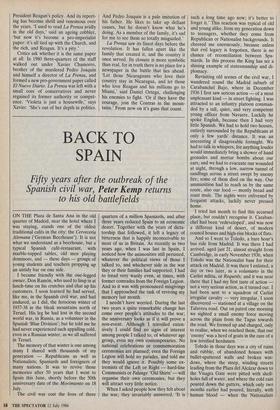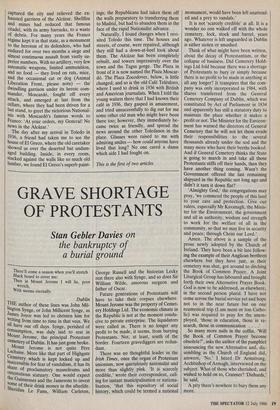BACK TO SPAIN
Fifty years after the outbreak of the to his old battlefields
ON THE Plaza de Santa Ana in the old quarter of Madrid, near the hotel where I was staying, stands one of the oldest traditional cafes in the city: the Cerveceria Alemana (`German Beerhouse'). It is not what we understand as a beerhote, but a typical Spanish café-restaurant, with marble-topped tables, old men playing dominoes, and — these days — groups of young students and teachers propping up an untidy bar on one side.
I became friendly with the one-legged owner, Don RamOn, who used to limp in at lunch-time on his crutches and chat up his customers. I soon learned he had served, like me, in the Spanish civil war, and had endured, as I did, the ferocious winter of 1937-38 in the bleak mountains north of Teruel. His leg he had lost in the second world war, in Russia, as a volunteer in the Spanish 'Blue Division'; but he told me he had never experienced such appalling cold, even in a Russian winter, as we all suffered in Teruel.
The memory of that winter is one among many I shared with thousands of my generation — Republicans as well as Nationalists; Spaniards and foreigners of many nations. It was to revive those memories after 50 years that I went to Spain this June, shortly before the 50th anniversary date of the Movirniento on 18 July.
The civil war cost the lives of three quarters of a million Spaniards, and after three years reduced Spain to an economic desert. Together with the years of dicta- torship that followed, it left a legacy of bitterness that is happily inconceivable to most of us in Britain. As recently as two years ago, when I was last in Spain, I noticed how the animosities still persisted, whatever the political views of those I talked to, and whichever side in the war they or their families had supported; I had to tread very warily even, at times, with former comrades from the Foreign Legion. And so it was with pronounced misgivings that I approached the task of reviving my memory last month.
I needn't have worried. During the last two years a quite remarkable change has come over people's attitudes to the war; the anniversary looks as if it will prove a non-event. Although I travelled exten- sively I could find no signs of interest among people I talked to, of whatever age group, even my own contemporaries. No national celebrations or commemoration ceremonies are planned; even the Foreign Legion will hold no parades, and told me they would ignore it. Possibly some ex- tremists of the Left or Right — hard-line Communists or Falange 'Old Shirts' — will organise their own ceremonies, but they will attract very little notice.
When I asked people how they felt about the war, they invariably answered, `It is such a long time ago now; it's better to forget it.' This reaction was typical of old and young alike, from my generation down to teenagers, whether they come from Republican or Nationalist backgrounds. It cheered me enormously, because unless that evil legacy is forgotten, there is no chance of reconciliation between Spa- niards. In this process the King has set a shining example of statesmanship and di- plomacy.
Revisiting old scenes of the civil war, I wandered round the Madrid suburb of Carabanchel Bajo, where in December 1936 I first saw serious action — of a most unpleasant kind — in street fighting. I was attracted to an infantry platoon comman- ded by a tall, quiet, and very competent young officer from Navarre. Luckily he spoke English, because then I had very little Spanish. We had to hold two houses, entirely surrounded by the Republicans at only a few yards' distance. It was an interesting if disagreeable fortnight. We had to talk in whispers, for anything louder would immediately bring a shower of hand grenades and mortar bombs about our ears; and we had to evacuate our wounded at night, through a low, narrow tunnel of sandbags across a street swept by enemy fire; some of them died on the way. Our ammunition had to reach us by the same route, also our food — mostly bread and roast mule. The nights were enlivened by frequent attacks, luckily never pressed home.
I tried last month to find this accursed place, but couldn't recognise it. Caraban- chel had been 'redeveloped', and was now a different kind of desert, of modem council houses and high-rise blocks of flats.
And so I went to Toledo, a bare hour's bus ride from Madrid. It was there I had arrived, aged just 21, almost straight from Cambridge, in early November 1936, when Toledo was the Nationalist base for their attack on Madrid. It was there I enlisted, a day or two later, as a voluntario in the Carlist mlitia, or Requetes; and it was near there that I had my first taste of action not a very serious action, as it turned out. I had been sent to a squadron of Carlist irregular cavalry — very irregular, I soon discovered — stationed at a village on the Talavera road. Out on patrol one morning we sighted a small enemy force moving across the plain from the Tagus towards the road. We formed up and charged, only to realise, when we reached them, that our `enemy' was a herd of goats in the care of a few terrified herdsmen.
Toledo in those days was a city of ruins and rubble, of abandoned houses with bullet-spattered walls and broken win- dows, where the steep, winding streets leading from the Plaza del Alcazar down to the Visagra Gate were pitted with shell- holes full of water, and where the cold rain poured down the gutters, which only two months earlier had poured, literally, with human blood — when the Nationalists captured the city and relieved the ex- hausted garrison of the Alcazar. Shellfire and mines had reduced that famous citadel, with its army barracks, to a waste of debris. For many years the Franco regime kept it in that state, as a monument to the heroism of its defenders, who had endured for over two months a siege and almost continuous assault from vastly su- perior numbers. With no artillery, very few automatic weapons, limited ammunition, and no food — they lived on rats, mice, and the occasional cat or dog (Animal Liberation Front, please note) — the dwindling garrison under its heroic com- mander, Moscard6, fought off every attack, and emerged at last from the cellars, where they had been driven for a last stand, to greet the victorious National- ists with Moscard6's famous words to Franco: 'At your orders, my General! No news in the Alcazar.'
The day after my arrival in Toledo in 1936, a friend had taken me to see the house of El Greco, where the old caretaker showed us over the deserted but undam- aged building. Inside, in every room, stacked against the walls like so much old lumber, we found El Greco's superb paint- ings; the Republicans had taken them off the walls preparatory to transferring them to Madrid, but had to abandon them in the face of the rapid Nationalist advance.
Naturally, I found changes when I revi- sited Toledo this time. The houses and streets, of course, were repaired, although they still had a down-at-heel look about them. The Alcazar has been completely rebuilt, and towers impressively over the town and the Tagus gorge. The Plaza in front of it is now named the Plaza Moscar- do. The Plaza Zocodover, below, is little changed; and so is the old Café Telesforo, where I used to drink in 1936 with British and American journalists. When I told the young waiters there that I had known their cafe in 1936, they gasped in amazement, and tried unsuccessfully to dig out for me some other old man who might have been there too; however, they immediately be- came twice as friendly, and spread the news around the other Toledanos in the place. Glasses were raised to me with admiring smiles — how could anyone have lived that long? No one cared a damn which side I had fought on.
This is the first of two articles.



















































 Previous page
Previous page